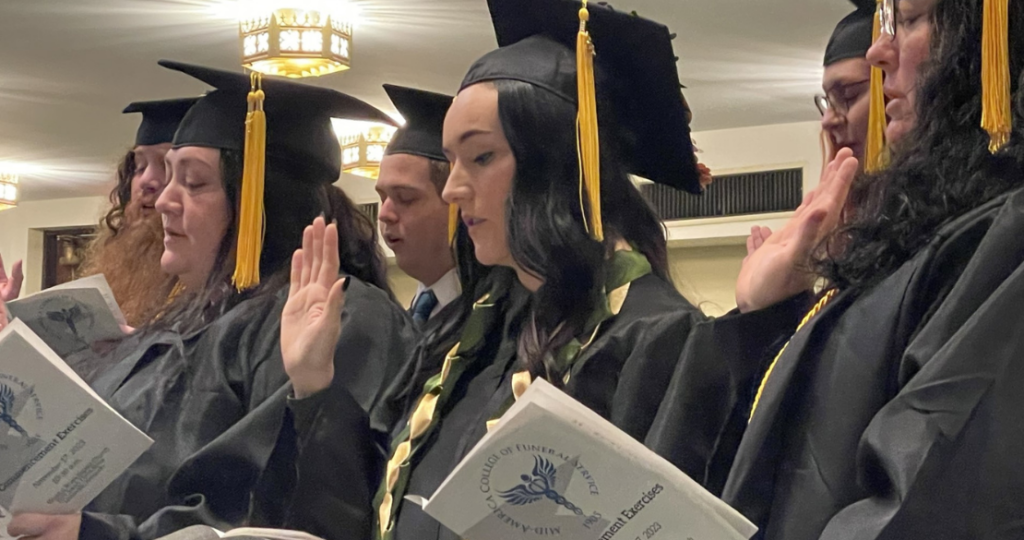Graduating from mortuary school is a major milestone, but it is only the beginning of your journey into the funeral service profession. As a new graduate, you may be asking: What’s next? How do I navigate licensing, apprenticeships, and career opportunities?
The transition from student to licensed funeral professional requires careful planning, the right certifications, and an understanding of career pathways. Whether you aim to become a funeral director, embalmer, crematory operator, or even own a funeral home, this guide will walk you through the essential steps after graduation and how to successfully launch your career.
Understanding Licensing Requirements
Why Licensing Matters
In the United States, most states require funeral service professionals to obtain a license to legally practice. Licensing ensures that funeral directors and embalmers meet educational, ethical, and professional standards required for serving grieving families.
State-Specific Licensing Requirements
Each state has its own funeral service licensing board, which sets regulations for:
- Required coursework and training hours
- The National Board Exam (NBE), administered by the International Conference of Funeral Service Examining Boards (ICFSEB)
- Completion of an apprenticeship or internship
To find specific state licensing requirements, visit the ICFSEB website or check with your state’s funeral service board.
Completing Your Apprenticeship or Internship
The Role of an Apprenticeship
Most states require one to two years of hands-on experience under a licensed funeral director or embalmer before granting full licensure. This period allows you to:
- Gain real-world experience in funeral home operations
- Develop technical embalming skills and grief support techniques
- Build professional relationships within the industry
Finding the Right Apprenticeship
To secure a placement:
- Connect with your school’s career services, such as Pierce Mortuary Colleges’ Career Services
- Attend industry networking events and funeral director association meetings
- Research local funeral homes and proactively reach out for apprenticeship opportunities
Passing the National Board Exam (NBE)
Preparing for the Exam
The National Board Exam (NBE) is a critical step toward becoming a licensed funeral director or embalmer. It consists of two sections:
- Arts Section – Covers funeral service law, ethics, counseling, and business operations
- Sciences Section – Covers embalming, pathology, microbiology, and restorative art
Study Tips for Success
- Use official practice tests and resources from the ICFSEB
- Join study groups with fellow graduates
- Take advantage of review courses and tutoring services offered by your school
A strong study plan and familiarity with test material will greatly increase your chances of passing on the first attempt.
Exploring Career Paths in Funeral Service
Once you have completed licensing requirements, the next step is choosing your career path. While many graduates become funeral directors or embalmers, there are multiple career options in the industry.
Popular Career Paths
- Funeral Director – Works directly with families to plan services, process legal documents, and manage funeral home operations
- Embalmer – Specializes in body preservation and restorative techniques
- Crematory Operator – Manages the cremation process and ensures compliance with industry regulations
- Green Burial Specialist – Focuses on environmentally friendly funeral practices
- Funeral Home Manager/Owner – Operates and oversees business functions of a funeral home
If you’re curious about some lesser-known roles in the field, check out our recent blog on 4 Unique Jobs in Funeral Service You May Not Have Known.
How to Find a Job After Graduation
- Use Pierce Mortuary Colleges’ job placement assistance to explore available roles
- Join professional organizations like the National Funeral Directors Association (NFDA)
- Leverage LinkedIn and industry-specific job boards to connect with potential employers
Continuing Education and Professional Development
Why Continuing Education Matters
Even after securing a job, funeral service professionals must continue learning. Many states require ongoing education to maintain licensure, and additional training can open doors to specialized career paths.
Options for Continuing Education
- Advanced Embalming and Restorative Art Courses – Enhances technical skills
- Grief Counseling Certification – Helps funeral directors better support families
- Business and Marketing Courses – Essential for those who plan to own a funeral home
Many continuing education programs are available through Pierce Mortuary Colleges and professional organizations like NFDA.
Building a Strong Professional Network
Networking for Career Success
The funeral service profession is built on trust, reputation, and relationships. Expanding your network can lead to job opportunities, mentorships, and career growth.
Where to Build Connections
- Join state and national funeral director associations
- Attend industry trade shows and conventions
- Connect with alumni from your mortuary college
Being active in the funeral service community will help you establish yourself as a trusted professional.
Taking the Next Steps in Your Funeral Service Career
Graduating from mortuary school is just the beginning of a lifelong, fulfilling career in funeral service. By successfully navigating licensing, apprenticeships, continuing education, and networking, you will be well-prepared for success.
Key Takeaways:
- Secure an apprenticeship for hands-on experience
- Prepare and pass the National Board Exam (NBE)
- Explore different career paths beyond funeral directing
- Invest in continuing education to advance your expertise
- Build a strong professional network for long-term career growth
Are you ready to take the next step in your funeral service career?
Pierce Mortuary Colleges offers the education, resources, and support to help you transition from student to funeral professional. Explore our programs here and apply today!
